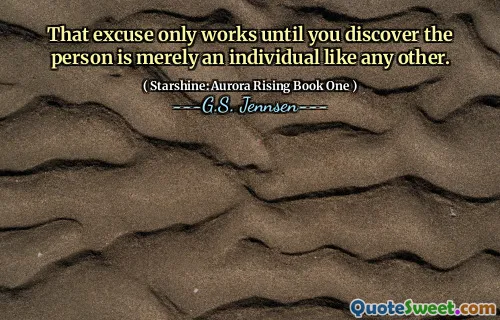
That excuse only works until you discover the person is merely an individual like any other.
This quote underscores the often fleeting nature of perceived exceptionalism or special treatment based on excuses. It suggests that once the veneer of justification falls away, what remains is the reality: every person is fundamentally just an individual with flaws, strengths, and imperfections. In our interactions, we might initially ascribe extraordinary qualities to someone or excuse their behavior with reasons we believe are justified — perhaps based on their circumstances, status, or experience. However, this quote prompts us to question the sustainability of those excuses when we truly get to know someone. It emphasizes the importance of seeing others as human beings first and foremost, rather than as beings defined by their excuses or external justifications.
In a broader sense, it reflects on the common tendency to project our biases or expectations onto others, only to be disillusioned when reality reveals their ordinary nature. Such realizations can be humbling, reminding us that nobody is inherently more deserving of special treatment simply because they have a compelling story or justification. It invites introspection about fairness, empathy, and the importance of understanding people beyond superficial explanations.
In the context of personal growth, this understanding can foster healthier relationships founded on genuine perception rather than assumption or prejudice. Recognizing every individual as just another person promotes humility and patience. It also serves as a reminder to be cautious of putting people on pedestals or making excuses for their behavior, as ultimately everyone is a complex tapestry of human qualities. The quote challenges us to look beyond excuses and see the intrinsic worth or flaws that define all of us, encouraging honesty in our perceptions and interactions.
Ultimately, it touches upon the universal truth of shared humanity, urging us to embrace others as they truly are, without relying on excuses as a shield for understanding or judgment.


